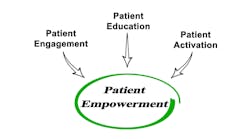Coding.
Does that term evoke images of pristine, crisp, detailed ICD-10 code zip-zapping around the ether, leaving reduced claims and billing errors in its formidable wake? Or does the mere thought of abandoning the relatively simpler days of ICD-9 give you a bellyache?
In this issue of HMT, we're focusing on that very issue, with a roundup of experts discussing the best ways to minimize mistakes during the conversion to ICD-10, as well as other articles on coding, claims and compliance.
I have a vested interest in this coding conversion conversation.
I recently received a bill for a few hundred dollars from the local hospital. Since I hadn't been to the hospital, this concerned me. I contacted the billing office, and a person there gave me several other numbers to call. After discussing the situation with a number of representatives from the hospital, the company that handles the hospital's billing and my health insurance company, I contacted the only two doctors I had seen within the past year who were connected in any way to the hospital. Both assured me I didn't owe them anything.
Apparently, the only way to get an itemized bill was to obtain and fill out a form allowing the hospital to send such information to me.
I filled out the form and sent it in. The next week I received another bill from the hospital, this time threatening to contact a collection service if the bill wasn't paid immediately in full.
I again filled out the form to request an itemized bill and sent it in. Weeks went by. Finally, I received in the mail a work order, coded for insurance, but nothing in English to tell me — the lowly patient — what I supposedly received for my money.
Before I could contact the hospital yet again, I received a call from a collection agency; and every day after that for a few weeks, several times a day.
I sent a letter to the collection agency, explaining the bill is in error and I am disputing it.
A co-worker gave me the name of someone to talk with at the hospital. We played phone tag. The harassing phone calls from the collection agency stopped.
Until yesterday, that is, when the calls began anew, with renewed vigor.
I guess I'll resume my phone-tag rally with the hospital, and continue to hope for a smooth transition to ICD-10 so that billing errors like this one — all too commonplace today — might become a thing of the past.
On a separate topic, I will be moderating a panel discussion, “From the Technology and Clinical Perspectives: Enterprise Planning for a Diversity of Mobile Devices,” at the third annual World Congress Leadership Summit on mHealth, July 28-29 in Cambridge, Mass. Hope to see you there.
Enjoy the magazine. And, until next time, here's wishing you good healthcare IT.


